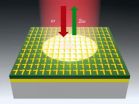(Press-News.org) Bottom Line: Women with long-term high blood pressure (hypertension) appear to be at an increased risk for the skin condition psoriasis, and long-term use of beta (β)-blocker medication to treat hypertension may also increase the risk of psoriasis.
Author: Shaowei Wu, M.D., Ph.D., of Brown University, Providence, Rhode Island, and colleagues.
Background: Psoriasis is an immune-related chronic disease that affects about 3 percent of the U.S. population. The authors suggest prospective data on the risk of psoriasis associated with hypertension is lacking. Antihypertensive medications, especially β-blockers, have been linked to psoriasis.
How the Study Was Conducted: Authors analyzed physician-diagnosed psoriasis in a group of 77,728 women who were part of the Nurses' Health Study from 1996 to 2008. Authors identified a total of 843 incident cases of psoriasis.
Results: Women with hypertension for six years or more were at a higher risk for developing psoriasis compared with women with normal blood pressure. The risk of psoriasis also was higher both among women with high blood pressure who did not take medication and among women with high blood pressure who did use medication compared with women with normal blood pressure. A higher risk for psoriasis was found among women who regularly used β-blockers for six years or longer. No association was found between other antihypertensive medications and the risk of psoriasis.
Discussion: "These findings provide novel insights into the association among hypertension, antihypertensive medications and psoriasis. However, further work is necessary to confirm our findings and clarify the biological mechanisms that underlie these associations."
(JAMA Dermatology. Published online July 2, 2014. doi:10.1001/jamadermatol.2013.9957. Available pre-embargo to the media at http://media.jamanetwork.com.)
Editor's Note: This study was supported in part by a grant from the National Institutes of Health. Please see the article for additional information, including other authors, author contributions and affiliations, financial disclosures, funding and support, etc.
Commentary: Psoriasis Provoked or Exacerbated by Medication
In a related commentary, April W. Armstrong, M.D., M.P.H., of the University of Colorado, Denver, writes: "A critical practice gap exists in identifying the causes of psoriasis flares, especially medication-related causes. Some physicians may not consistently examine medications for their contribution to psoriasis flares. However, a careful consideration of the role of medications in psoriasis exacerbation may improve long-term psoriasis control."
(JAMA Dermatology. Published online July 2, 2014. doi:10.1001/jamadermatol.2014.1019. Available pre-embargo to the media at http://media.jamanetwork.com.)
Editor's Note: Please see the article for additional information, including other authors, author contributions and affiliations, financial disclosures, funding and support, etc.
INFORMATION:
Media Advisory: To contact corresponding author Abrar A. Qureshi, M.D., M.P.H., call David Orenstein at 401-863-1862 or email David_Orenstein@brown.edu. To contact commentary author April W. Armstrong, M.D., M.P.H., call Erika Matich at 303-724-1528 or email Erika.Matich@ucdenver.edu
Hypertension, antihypertension medication, risk of psoriasis
2014-07-02
ELSE PRESS RELEASES FROM THIS DATE:
Study estimates effect on surgery following national health insurance expansion
2014-07-02
Bottom Line: Full implementation of the Affordable Care Act's (ACA) national health insurance expansion could result in many more discretionary surgical procedures in the next few years based on how utilization changed after an earlier insurance reform in Massachusetts.
Author: Chandy Ellimoottil, M.D., of the University of Michigan, Ann Arbor, and colleagues.
Background: The potential effect of the ACA on surgical care is not well known. The authors examined its possible effect by analyzing the Massachusetts insurance expansion and utilization of discretionary and ...
Trial examines treatment for psychogenic nonepileptic seizures
2014-07-02
Bottom Line: A clinical trial found a reduction in seizures and improvement in related symptoms, including depression and anxiety, in patients with psychogenic nonepileptic seizures (PNES) who were treated with cognitive behavioral therapy informed psychotherapy (CBT-ip) with and without the medication sertraline.
Authors: W. Curt LaFrance, Jr., M.D., M.P.H., of Brown University, Rhode Island Hospital, Providence, R.I., and colleagues.
Background: PNES is not responsive to standard treatment and can be made worse by antiepileptic medications. Up to 20 percent of civilians ...
SDSC assists researchers in novel wildlife tracking project
2014-07-02
A team including researchers from the U.S. Geological Survey (USGS) and the San Diego Zoo's Institute for Conservation Research has developed a novel methodology that for the first time combines 3D and advanced range estimator technologies to provide highly detailed data on the range and movements of terrestrial, aquatic, and avian wildlife species.
A paper detailing the project, called 'Movement-based Estimation and Visualization of Space Use in 3D for Wildlife Ecology and Conservation', was published July 2 in the PLOS ONE online science journal. A video of the project ...
Noninvasive advanced image analysis could lead to better patient care
2014-07-02
PHOENIX, Ariz. — July 2, 2014 — Lung cancer patients could receive more precise treatment, and their progress could be better tracked, using a new high-tech method of non-invasive medical imaging analysis, according to a study published today by the journal PLOS ONE.
Genetic changes increasingly are recognized as driving cancer development. But obtaining evidence of these changes usually requires a biopsy, which can be problematic for sensitive regions of the body such as the lungs.
Based on a review of 48 patients with non-small cell lung cancer (NSCLC), the study ...
Researchers invent 'meta mirror' to help advance nonlinear optical systems
2014-07-02
Researchers at the Cockrell School of Engineering at The University of Texas at Austin have created a new nonlinear metasurface, or meta mirror, that could one day enable the miniaturization of laser systems.
The invention, called a "nonlinear mirror" by the researchers, could help advance nonlinear laser systems that are used for chemical sensing, explosives detection, biomedical research and potentially many other applications. The researchers' study will be published in the July 3 issue of Nature.
The metamaterials were created with nonlinear optical response ...
A million times better
2014-07-02
This news release is available in German.
Lasers have a fixed place in many fields of application. Yet, there are still wavelengths for which either no systems exist, or at best only large and expensive ones. On the other hand remote sensing and medical applications call for compact laser systems, for example with wavelengths from the near infrared to the Terahertz region.
A team of researchers at the Technische Universitaet Muenchen (Germany) and the University of Texas Austin (USA) has now developed a 400 nanometer thick nonlinear mirror that reflects frequency-doubled ...
Scientists can now screen for stem cells that enhance corneal regrowth
2014-07-02
A Boston-based scientific collaborative, led by Harvard Stem Cell Institute (HSCI) researchers, has discovered a way to collect the best cell type for regenerating a damaged cornea—the clear membrane that covers the pupil and directs light into the back of the eye. The investigators report in the journal Nature that purified human stem cells can be used to improve long-term vision in mice. The team is now pursuing FDA-approval for the technique before moving on to patient clinical trials.
The study, lead by co-senior investigators Natasha Frank, MD, and Markus Frank, ...
Die-offs of band-tailed pigeons connected to newly discovered parasite
2014-07-02
A new pathogen has been discovered by scientists investigating major
die-offs of pigeons native to North America, according to studies led
by the University of California, Davis, and the California Department
of Fish and Wildlife.
Scientists were able to implicate this new parasite, along with the
ancient parasite Trichomonas gallinae, in the recent deaths of
thousands of Pacific Coast band-tailed pigeons. The die-offs occurred
during multiple epidemics in California's Central Coast and Sierra
Nevada mountain ranges. Scientists named the new pathogen Trichomonas
stableri.
Avian ...
Computer-automated, time-lapse embryo photography may increase success of IVF
2014-07-02
PHILADELPHIA - Using computer-automated, time‐lapse photography of embryos in the laboratory during in-vitro fertilization may improve embryo selection, potentially increasing the chances of pregnancy among women undergoing the procedure, according to new research from the Perelman School of Medicine at the University of Pennsylvania and five other fertility centers. Results of the study were presented this week at the 30th annual European Society of Human Reproduction and Embryology (ESHRE) meeting in Munich, Germany.
The researchers at Penn and their collaborators ...
Novel intravaginal ring shows promise for HIV prevention
2014-07-02
A novel intravaginal ring implanted with anti-retroviral drug tablets, or pods, demonstrated sustained and controlled drug release and safety over 28 days, according to a paper published ahead of print in Antimicrobial Agents and Chemotherapy. The ring, designed to prevent transmission of HIV, was tested in pig-tailed macaque monkeys, and is engineered to be inexpensive, all the better for use in developing countries, says corresponding author Marc Baum.
One of the two drug combinations tested in the ring had been shown in three clinical trials to prevent HIV—some of ...



